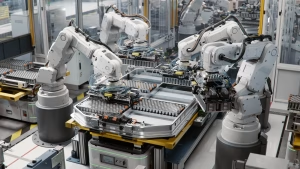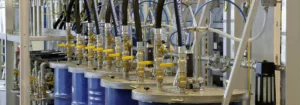Smart air motors are strong automation solutions that combine advanced sensors and intelligent features to streamline operations across a wide range of industries. From automated assembly lines to aerospace applications, smart air motors’ adaptability continues to transform current production processes. Let’s look at the numerous application cases where these innovative technologies are having a big influence.
Automated Assembly Lines
Pick-and-place machines, robotic arms, and conveyor belts are all driven by smart air motors on assembly lines. These motors’ excellent control capabilities guarantee exact item placement and smooth assembly processes.
Material Handling and Packaging
Conveyor rollers, sorting devices, and packaging equipment are driven by air motors in material handling and packaging applications. The ability to optimize material flow and packing efficiency through real-time sensor data boosts overall productivity.
Food and Beverage business
Smart air motors are used in this business for a variety of functions, including pumping, stirring, and mixing. These motors guarantee adherence to strict food safety regulations since they are hygienic in design and have sensor-based safety features.
Pharmaceutical manufacture
Tablet presses, capsule fillers, and liquid dispensers are just a few of the crucial operations in pharmaceutical manufacturing that are powered by smart air motors. Integrated sensors ensure the dependability and quality of pharmaceutical items by monitoring critical factors, including temperature, pressure, and motor health.
Automated Guided Vehicles (AGVs)
For accurate load handling and navigation in factories and warehouses, AGVs depend on intelligent air motor. These motors, which have sensors built into them, can detect obstructions, change their speed, and guarantee safe movement—all of which help to improve logistical processes.
Automation in the Lab
Air motors drive centrifuges, pipetting robots, and sample handling apparatus in the lab. Sensitive experimentation and analysis are made easier by sensor feedback, which improves lab process accuracy and repeatability.
Defense and Aerospace:
Intelligent air motor play a crucial role in aviation systems, powering operations including cargo handling, landing gear, and flaps. Sensors provide real-time data for maintenance and operational safety while continually monitoring performance.
Cleanroom Environments:
Air motors with non-contact linear sensors are used in semiconductor production facilities. Their accurate motion control skills reduce the number of particles that are contaminated, upholding the high standards of cleanliness necessary in these kinds of environments.
Actuators for Valves and Dampers:
In a variety of industrial applications, smart air motor function as actuators to control dampers, regulate fluid flow, and modify process parameters. For increased efficiency and dependability, sensors allow for the maintenance of ideal valve settings and system integrity monitoring.
Air motors power the joint motions of robotic grippers and arms in the field of industrial robotics. In automated production environments, sensor feedback improves safety and productivity by enabling adaptive control and collision avoidance.
To sum up, smart air motors are a paradigm leap in automation because they combine safety, intelligence, and accuracy to optimize a variety of industrial processes. Their revolutionary influence keeps modern industries’ production lines, labs, and aerospace applications buzzing with efficiency and creativity.
For further insights and detailed technical information, consult the Pocket Guide to Air Motors by Atlas Copco or Contact us directly.


